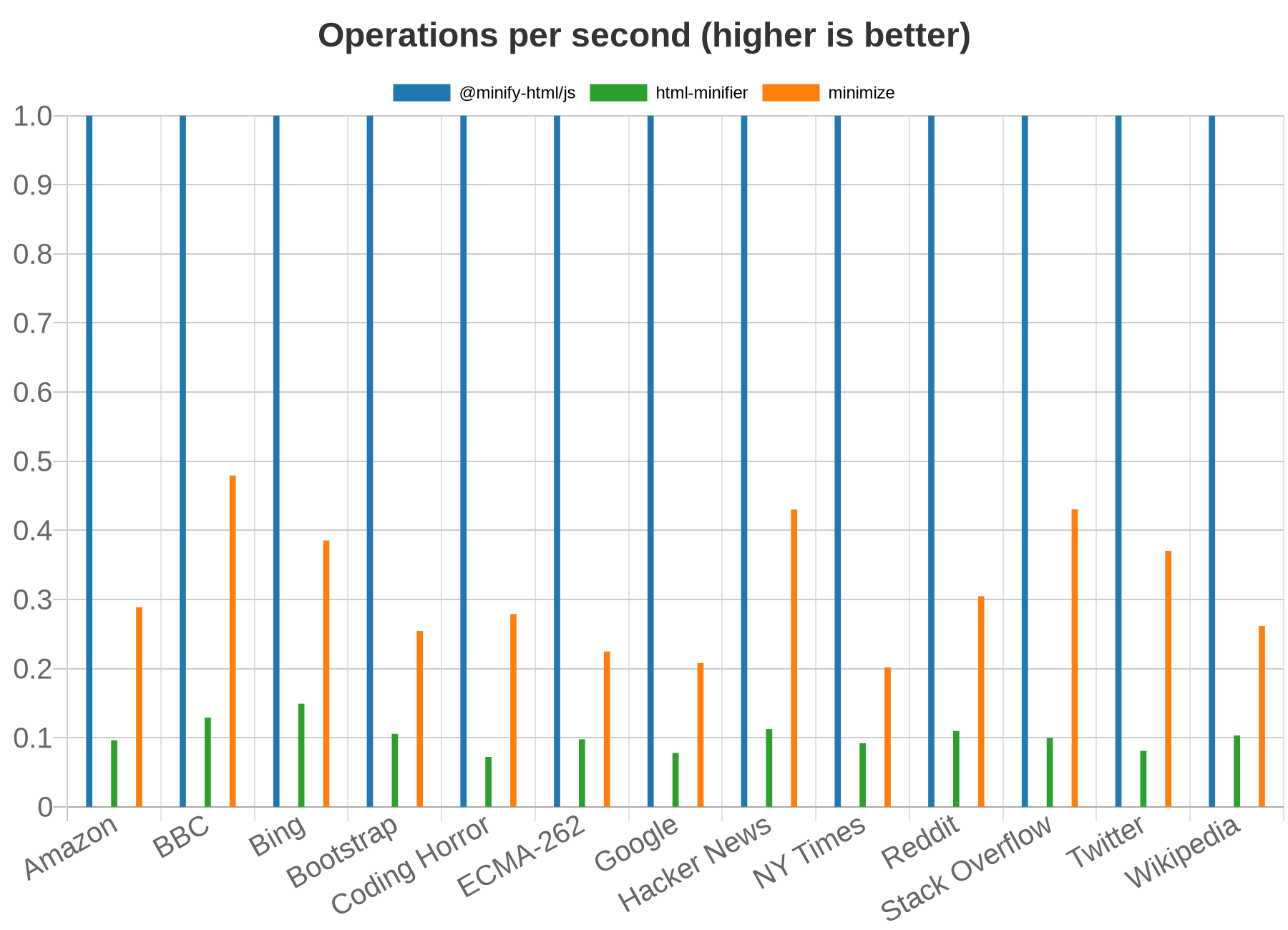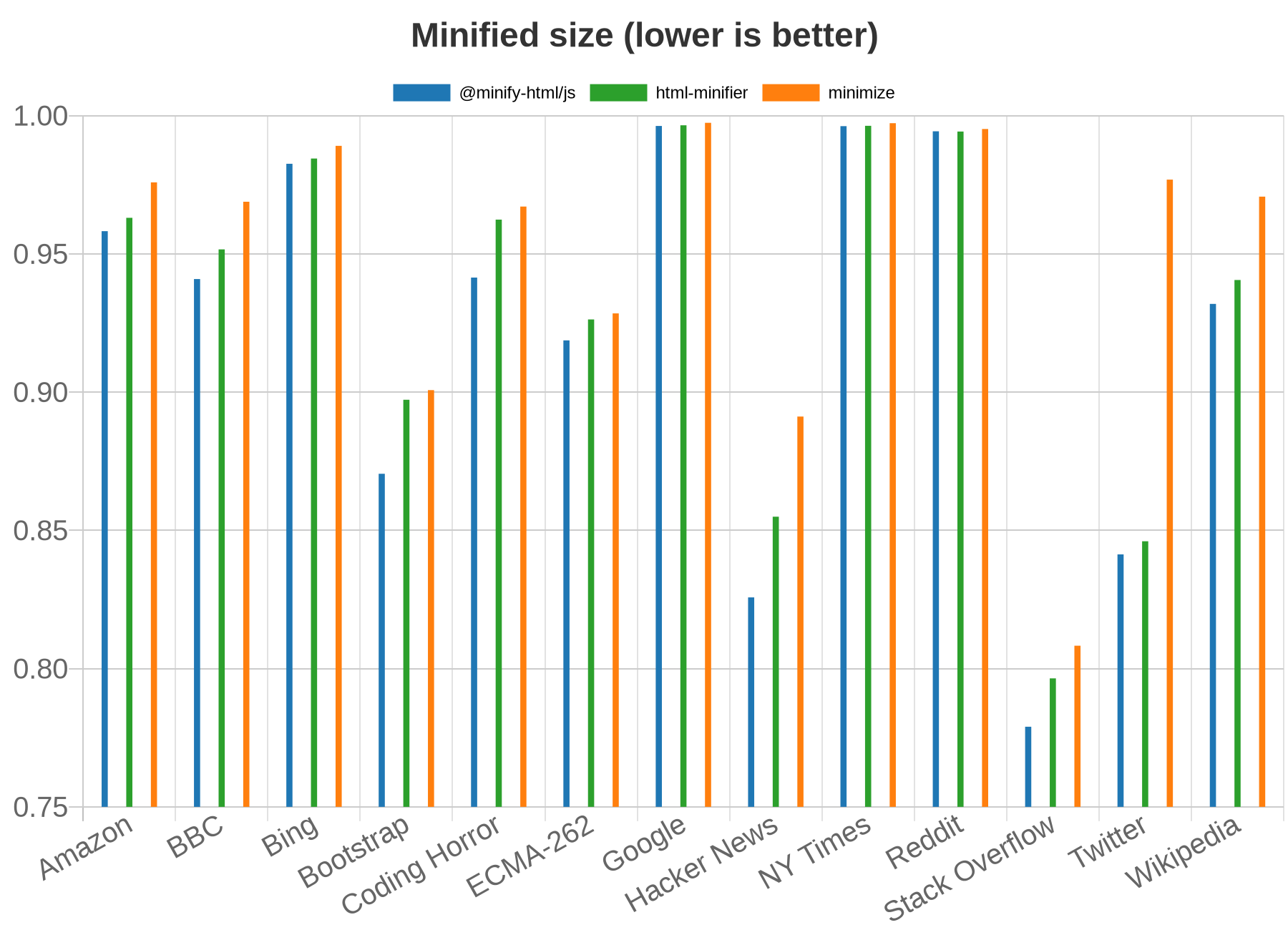|
|
||
|---|---|---|
| .. | ||
| minify-html-bench | ||
| tests | ||
| .gitignore | ||
| .nvmrc | ||
| README.md | ||
| bench.sh | ||
| build.sh | ||
| compare.sh | ||
| fetch.js | ||
| graph.js | ||
| minifiers.js | ||
| package.json | ||
| profile.sh | ||
| results.js | ||
| sizes.js | ||
| speeds.js | ||
| tests.js | ||
README.md
Benchmarking
This folder contains scripts used to test the performance and effectiveness of minify-html, for guided optimisation and/or comparisons.
It also contains a set of common web pages as tests for benchmarking.
Comparison
The Node.js version of minify-html is tested against html-minfier and minimize in two dimensions:
- Speed as operations per second.
- Minified file size compared to the original.
Benchmark.js is used to determine speed. Each minifier is run against each file in the tests folder, which are HTML pages fetched from popular websites:
| File name | URL |
|---|---|
| Amazon | https://www.amazon.com/ |
| BBC | https://www.bbc.co.uk/ |
| Bootstrap | https://getbootstrap.com/docs/3.4/css/ |
| Bing | https://www.bing.com/ |
| Coding Horror | https://blog.codinghorror.com/ |
| ECMA-262 | https://www.ecma-international.org/ecma-262/10.0/index.html |
| https://www.google.com/ | |
| Hacker News | https://news.ycombinator.com/ |
| NY Times | https://www.nytimes.com/ |
| https://www.reddit.com/ | |
| Stack Overflow | https://www.stackoverflow.com/ |
| https://twitter.com/ | |
| Wikipedia | https://en.wikipedia.org/wiki/Soil |
Note that these pages are already mostly minified.
For more information on how the tests are fetched, see fetch.js.
On this project's README, average graphs are shown. Graphs showing per-test results are shown below:


Since speed depends on the input, speed charts show performance relative to the Node.js minify-html as a percentage.
The settings used for each minifier can be found in minifiers.js. Some settings to note:
conservativeCollapseis enabled for html-minifier as otherwise some whitespace would be unsafely removed with side effects. minify-html can safely remove whitespace with context if configured properly.
Running
Make sure to install the dependencies listed in package.json by running npm i or yarn.
Run build.sh to build @minify-html/js with the local minify-html.
Run sizes.js to run each HTML minifier against each test and record the minified size results. This will also output the minified files in min if inspection of minified outputs is necessary. compare.sh is a useful script for viewing a character-by-character diff between the minified outputs of minify-html and html-minifier for a specific test. Pass the test's file name as the first argument.
Run speeds.js to benchmark the performance of each HTML minifier against each test and record the op/s results.
Run graph.js to render graphs from recorded speed and size results in the results folder.
minify-html-bench
The minify-html-bench folder contains a Rust executable subproject that runs the local minify-html on all tests for many iterations to calculate speed as operations per second.
This can be useful for profiling the core code or checking the performance of minify-html in other languages with native bindings.
It takes two arguments:
--tests: path to the folder containing tests to use as inputs.--iterations: how many iterations to run per test.
The results will be written to stdout as a JSON object, where properties are the test file names and values are the operations per second.
Profiling minify-html can be done on Linux by using profile.sh, which uses perf. The generated report can be used using perf report.